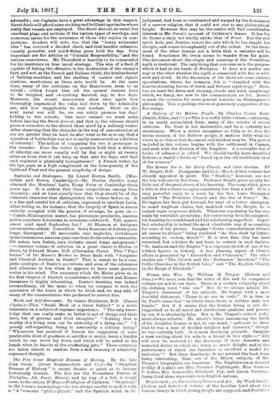The Five Great Skeptical Dramas of History. By the late
John Owen. (Swan Sonnenschein and Co.)—By "Skeptical Dramas of History" is meant dramas so great as to become historically famous. The five are the Prometheus Vinctus of ZEschylus, Job, Faust, Hamlet, and by way of a foil, it would seem, to the others, El Magic° Prodigioso of Calderon. "Skeptical," in Mr. Owen's terminology—he was always careful to spell it with a "k "—meant "philosophical," and the Spanish mind, in his judgment, had been so constrained and warped by the dominance of a narrow religion, that it could not rise to any philosophical height. However this may be, the reader will find considerable interest in Mr. Owen's account of Calderon's drama. It has for its theme a story not wholly unlike that of Faust. But the evil spirit fails, and Justina resists the arts which he has taught his disciple, and comes triumphantly out of the ordeal. In the treat- ment of the other dramas not a little that is valuable will be found. Sometimes Mr. Owen seems to wander from hie point. The discussion about the origin and meaning of the Prometheus myth is irrelevant The only thing that concerns us is the purpose which it had in the hands of Eschylus. It does not matter one way or the other whether the myth is connected with fire or with mist and cloud. In the discussion of Job there are some curious speculations, where, for instance, Job is "classified with the heaven-storming heroes of Greek and Hebrew mythology." Here. too, we meet the dawn and evening, clouds and wind, imaginings which, we fancy, are new to the commentators on Job. Hamlet is made the occasion for some general remarks on Shakespeare's philosophy. This is perhaps the most genuinely suggestive of tho five essays.


































 Previous page
Previous page